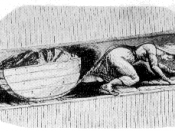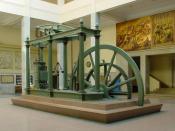No development in modern history has affected individuals more than the Industrial Revolution, and the manufacture of textiles played a key role. British economist Arnold Toynbee popularized the phrase "The Industrial Revolution" in the 19th century (Wikipedia "Arnold Toynbee"). In addition to the actual technical developments, the phrase includes the broad economic and social consequences, which occurred as a result of the technical innovations. The central core of the Industrial Revolution was the rise of the Factory System. Here workers were brought together rather than working at home. The increased productivity provided another boost to European population growth. Europe's population, which had been decimated by the plague, was greatly stimulated when Spanish conquistadors brought the potato back from Peru in the 16th century ("The Potato Then & Now"). Because of the Industrial Revolution, cities grew in size as centers of production. Complex systems of transportation were developed, including canals, steamboats, and trains and improved communications including the telegraph.
The modern corporation rose as the dominant form of business organization. The technical advances fueled additional and expanded scientific investigation. One of the adverse consequences was the expanded use of child labor and the dreadful conditions that many men, women, and children worked under in textile mills and other factories and mines.
Individuals from different classes of society expressed their repugnance and disgust, through the utilization of the press, for the plight of the working class. Richard Oastler's fearless oratory and his damning 1830 article, "Yorkshire Slavery," published in the Leeds Mercury, brought factory oppression to the notice of a wide public. Furthermore, a speech entitled "An Address by a Journeyman Cotton Spinner," published in The Black Dwarf, contributes to the first by providing a raw and unadorned depiction of the factory system. These two works of literature...


